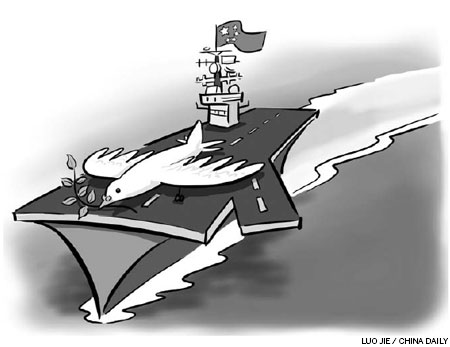China needs aircraft carriers

Aircraft carriers have become an integral part of a good navy. In fact, a navy is not considered good enough if it does not have aircraft carriers.
No wonder, the United States plans to build 10 Gerard Ford-class aircraft carriers, which can serve up to 50 years and replace 10 commissioned ships. The US will commission the first Ford-class carrier in 2014 and the last in 2048, which will help it maintain its dominance in oceans.
In comparison, China still lacks some major weaponry such as long-range strategic bombers, heavy transport aircraft and aircraft carriers. The country is still waiting for its first aircraft carrier to turn its naval defense capability from green water to blue water.
Given the circumstances, China should develop aircraft carriers in three stages: revamped and self-constructed medium-sized conventional aircraft carriers, self-developed nuclear-powered aircraft carriers, and self-developed giant nuclear-powered vessels. The country urgently needs its first carrier to increase its combat effectiveness.
China, however, should develop its aircraft carrier fleet in accordance with the defensive nature of its national defense policy. Since China is still a developing country, it should continue giving priority to economic development and deepening its reform and opening-up policies. After all, it needs long-term stability and a peaceful environment for economic development to maintain its defensive defense policy.
Aircraft carriers are essential for China primarily to defend its territory and territorial waters and bring a semblance of parity among the world's big powers. Though some people try to use China's quest for an aircraft carrier to justify their "China threat theory", the truth is that China has never used and will never use its military power for expansionary purposes.
History show that despite being perhaps the world's strongest naval power in the 15th century, China never invaded another country. Instead, the Ming Dynasty (1368-1644) government sent Zheng He on seven naval expeditions from 1405 to 1433 to places such as Arabia, Brunei, East Africa, India, the Malay Archipelago and Thailand to boost friendly exchanges.
Zheng He's truly friendly and commercial voyages were in sharp contrast to his European counterparts' adventures to colonize countries about half a century later.
Contrary to general fears, China needs aircraft carriers because they are important for cooperation as well as a counterbalancing force among the big powers. China is the only permanent United Nations Security Council member that has no aircraft carrier. Even some of the non-Security Council members have them. This has left China at a strategic disadvantage.
Since the 1990s, the increasingly unbalanced use of advanced strategic forces like carriers and nuclear weapons by some countries has been undermining peace and slowing down world economic development. Some countries' unilateral actions have more often than not intensified regional conflicts. Once China adds aircraft carriers to its naval fleet, it could act as a counterbalancing force for such countries.
Defense Minister Liang Guanglie has said China cannot be without aircraft carriers forever, especially because of the increasing power struggle in the international arena.
Also, China's 2010 defense white paper emphasized "the People's Liberation Army (PLA) Navy's endeavors to expedite the modernization of its integrated combat forces, enhancement of its capabilities in strategic deterrence and counterattack", and development of its "capabilities in conducting operations in distant waters and in countering non-traditional security threats".
Aircraft carriers can be used as strategic deterrence and to thwart outside interference in regional affairs. As Andrew Erickson, of the US Naval War College, once said, China doesn't want war, but it wants to ensure that any action against its national core interests can be well deterred.
An aircraft carrier is a strategic equipment that indicates a navy's power and depth. Aircraft carries, as well as nuclear weapons, electronics, information technology, cyberspace technology, economic development and preparedness are some of the modern deterrents that can ensure national security.
Also, because of their huge size, advanced equipment, rich reserves and well-trained soldiers, aircraft carriers are highly effective in and capable of providing timely relief to people in the event of disasters, both man-made and natural.
For example, when floods and mudslides hit Thailand in March, affecting about 1 million people and stranding about 15,000 tourists in different places, the Thai government dispatched its only aircraft carrier, with four helicopters, accompanied by three other navy vessels to help relief efforts and evacuate people. And after a deadly earthquake and deadlier tsunami hit Japan on March 11, the US Navy quickly sent its vessels along with nuclear-powered supercarrier USS Ronald Reagan to help Japan in its relief and rescue operations.
The Chinese government and the PLA also use military personnel and equipment to help relief and rescue work in disaster-hit areas. So aircraft carriers can also strengthen China's relief, rescue and evacuation operations and help it better coordinate and execute its plans.
The author is an associate professor at Economic Security and National Defense Economy Institute, School of Economics, Renmin University of China.
(China Daily 07/15/2011 page9)


















